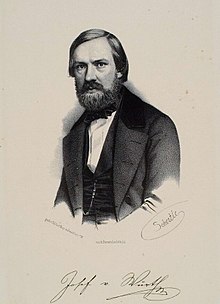Joseph von Würth
Joseph Edler von Würth (often Josef , including his own signature ; * 1817 in Vienna ; † January 17, 1855 ibid) was an Austrian administrative lawyer and politician .
Life
Joseph von Würth came from the old Viennese court silversmith family Würth (formerly also Wirth). A great uncle was Johann Nepomuk Würth . The grandfather Ignaz Würth (1746–1834) was ennobled in 1827 with the hereditary predicate noble . When he died in 1834 at the age of 88, he left behind nine children and 16 grandchildren, as well as a five-story house in Vienna, which he owned in 1794. In 1834 Joseph von Würth belonged to the community of heirs, like his cousin and future wife, Baron von Sacken. As a result, the house was sold to the co-heir Anton Edler von Würth, master of Oberdöbling and Währing , and his wife. In the first half of the 19th century, a large part of Ignaz Edler von Würth's descendants still lived in Vienna.
Würth completed high school and philosophical studies in Vienna . He then went to the University of Vienna . There he studied law . He graduated with the promotion to Doctor of Law from. After completing his studies, he switched to civil service and also appeared as a writer. On November 17, 1847 he was appointed to the council minutes adjunct at the kk Supreme Judicial Office.
Würth stood for election to the Frankfurt National Assembly in the 6th constituency of Austria under the river Enns in Vienna-Josephstadt and was able to win the mandate. He was a member of the assembly from May 18, 1848 to March 19, 1849 and belonged to the Casino and Pariser Hof factions . He was appointed undersecretary of state by Anton von Schmerling , the de facto head of cabinet and interior minister. He was on friendly terms with him. He was considered loyal to the Austrian point of view and left the National Assembly in protest against the possible transfer of the hereditary Austrian Empire to Prussia.
Würth was when, after his return Oberlandesgerichtsrat and has been a speaker in led by Anton von Schmerling Justice Ministry in Vienna there among other expert for prison affairs . He died in this office. He was buried in the Dornbacher Friedhof .
family
In 1845 Würth married his cousin Karoline Freiin von Sacken (1820-1853), daughter of Baron Joseph von Sacken and Karoline Edle von Würth, sister of Baron Eduard von Sacken . The daughters Ottilie and Johanna came from the marriage. In 1868, Johanna was still a minor, and they belonged to the community of heirs to the house in Vienna that was touched by her great-grandfather Ignaz, to whose community of heirs her parents had already belonged in 1834.
Ottilie (* 1847) married Field Marshal Lieutenant Ritter Karl von Schmedes (1828–1886) in Vienna in 1866 and called herself Ottilie von Schmedes-Würth as a painter.
Johanna married the General von Kaschau , who was subsequently in command until 1901 and an honorary citizen of Losoncz , noble Hermann von Pokorny .
Works (selection)
- The latest advances in the prison system in France, England, Scotland, Belgium and Switzerland , Beck, Vienna 1844.
- The thirteenth-century municipal law of Wiener-Neustadt: a contribution to Austrian legal history , Sollinger, Vienna 1846.
- The Austrian Code of Criminal Procedure of January 17, 1850: explained and presented in comparison with the laws of other countries , Braumüller, Vienna 1851.
literature
- Josef von Würth. Obituary . In: Klagenfurter Zeitung , 1855, No. 20, p. 77.
- Constantin von Wurzbach : Würth, Joseph Edler von . In: Biographisches Lexikon des Kaiserthums Oesterreich . 58th part. Kaiserlich-Königliche Hof- und Staatsdruckerei, Vienna 1889, pp. 230–232 ( digitized version ).
- Franz Ilwof : Würth, Josef Edler von . In: Allgemeine Deutsche Biographie (ADB). Volume 55, Duncker & Humblot, Leipzig 1910, pp. 131-135.
Web links
- Works by and about Joseph von Würth in the German Digital Library
- Lithography by Josef von Würth on leo-bw.de
Individual evidence
- ↑ Non-profit and exhilarating house calendar, 1834, pp. 33f. , BLKÖ: Würth, Ignaz Edler from .
- ^ A b Edward Matar, Success Factors for Integrated Communication Measures, 2014, p. 36 .
- ^ Negotiations of the Lower Austrian Trade Association, 1842, p. 92 .
- ^ Genealogical paperback of the noble houses of Austria, p. 551 .
- ^ View of Sarajewo by Ottilie von Schmedes-Würth .
- ↑ Genealogical pocket book of the noble houses of Austria, p. 112 .
| personal data | |
|---|---|
| SURNAME | Würth, Joseph von |
| ALTERNATIVE NAMES | Würth, Joseph Edler von (full name); Würth, Josef von |
| BRIEF DESCRIPTION | Austrian administrative lawyer and politician |
| DATE OF BIRTH | 1817 |
| PLACE OF BIRTH | Vienna |
| DATE OF DEATH | January 17, 1855 |
| Place of death | Vienna |
